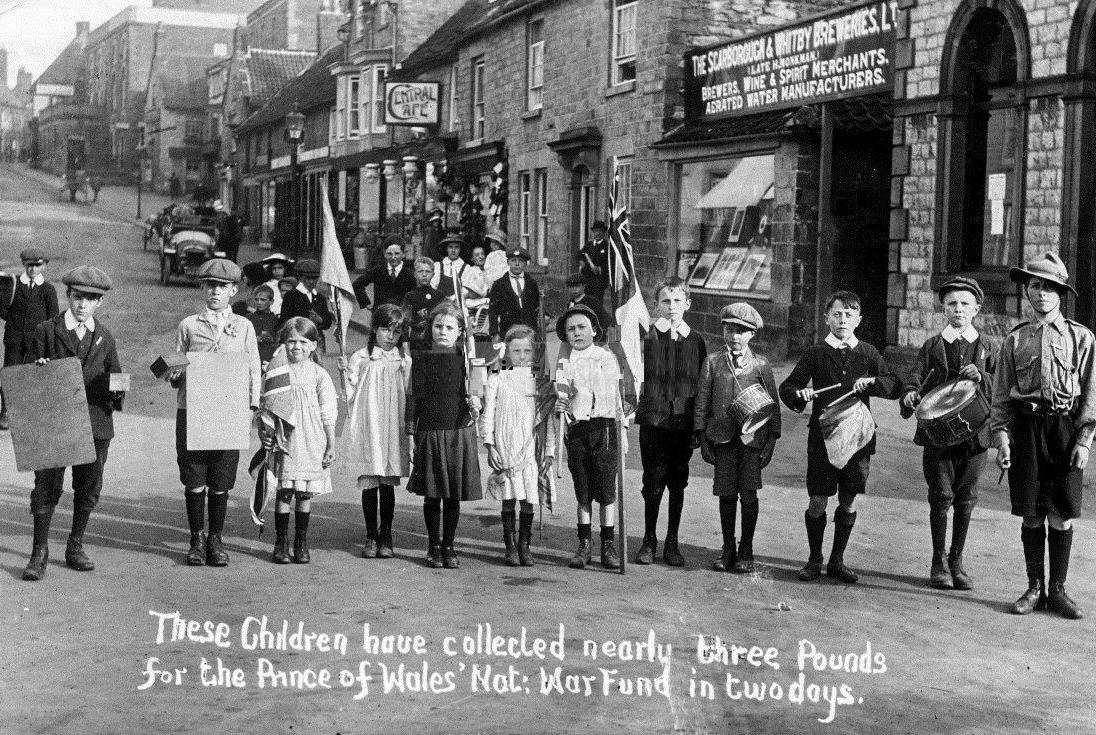
British World War I Humanitarian Effort: Individul Charities -- Prince of Wales National War / Relief Fund

Figure 1.--The National War/Relief Fund was the most ptominent of all the British World war I charities. It was sponsored by the Price of wakes and thus often referred to as the Prince of Wales Narional War Fuind. The caption here read "These children have collected nearly three Pounds for the Prince of Wales' Nat. War Fund in two days." The village here is Pickering, an ancient market town in the Ryedale district of North Yorkshire near near the North York Moors National Park. Notice there is only one car in the whole village. All kinds of groups like these town children were unvolved in fund raising for the Fund.
|
|
Perhaps the most important war-time charity was the National Relief Fund, sometimes referred to as the National War Fund. It was founded only days after Britain declared war. Edward, Prince of Wales, was recruited as treasurer. It thus became referred to as the Prince of Wales National War Fund or the National War Fund. The purpose was to help the poorer families of the millions of men in the services and ease the suffering from what was described as 'industrial distress'. Conscripting men in the millions meant taking away the family bread winners. The meager soldiers' pay was only a fraction of the wages the men had been earning. This not only left millions of families without their heads, but meant that they were reduced to poverty. The Prince of Wales in the era before TV or even radio, publicized the effort through the newspapers. (Ironically two decades later he would deliver one of the most famous radio addresses of all time when he announced his abdication.) His message in The Times and major newspapers stated, " At such a moment we all stand by one another, and it is to the heart of the British people that I confidently make this earnest appeal." In only a week a £1 million in donations poured in the the Fund. ( £1 million was a great deal of money in 1914. ) Some £5 million the first year or in 2014 terms nealy £0.5 billion. The Fund set the tone of national philanthropic unity of spirit that would continue for the duration of the War. [Grant]
Sources
Grant, Peter. Philanthropy and Voluntary Action in the First World War.
CIH -- WW I

Navigate the CIH World War I Section:
[Return to the Main English charities page]
[Return to the Main English home front page]
[About Us]
[Aftermath]
[Alliances]
[Animals]
[Armistace]
[Biographies]
[Causes]
[Campaigns]
[Casualties]
[Children]
[Countries]
[Declaration of war]
[Deciding factors]
-------[Diplomacy]
[Economics]
-------[Geo-political crisis]
[Home front]
[Intelligence]
[Military forces]
[Neutrality]
[Pacifism]
[People]
[Peace treaties]
[Propaganda]
[POWs]
[Russian Revolution]
[Terrorism]
[Trench warfare]
------[Technology]
[Weaponry]
[Bibliographies]
[Contributions]
[FAQs]
[Images]
[Links]
[Registration]
[Tools]
[Return to Main World War I page]
[Return to Main war essay page]
[Return to CIH Home page]
Navigate the Historic Boys' Clothing Web chronological pages:
[The 1840s]
[The 1900s]
[The 1930s]
[The 1940s]
[The 1950s]
[The 1960s]
[The 1970s]
[The 1980s]
[The 1990s]
Created: 7:48 AM 10/6/2016
Last updated: 7:48 AM 10/6/2016



